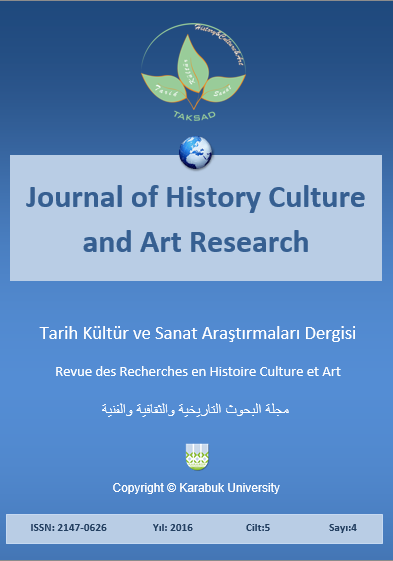The Role of Iran and America's Middle East Policy in Peace Process of Middle East 2001-2016
DOI:
https://doi.org/10.7596/taksad.v5i4.588Keywords:
Diplomatic relations, Iran foreigner policy, U.S.A. foreign policy, Middle East peace.Abstract
Abstract
The Middle East peace process has become the most important international Middle Eastern politics phenomenon during the recent decades. Since the U.S. has realized the political, military and economic power of Iran and its influence as peace building in the Middle East, diplomacy with a common approach on the agenda has developed between these two countries. Therefore, the purpose of this study is to investigate American and Iranian role in the Middle East and diplomatic relations between the two countries in the process of establishing peace in the region. The main question in the present research is that; what is the role of American and Iranian Middle East policy in the peace process in the Middle East during 2001-2016? To response to the question, a descriptive—analytical approach is implemented. The results suggest that the lack of diplomatic relations between Iran and America in the years 2001-2016 is one of the main reasons of the lack of security and peace in the Middle East. Accordingly, creating opportunities and establishing diplomatic relations (political, economic, social, and etc.) between Iran and America with the interests of the two countries as the two poles of influence in all parts of the region, not only provides security, but also is an indicator to stabilize discipline and a lasting peace in the region. Last but not least, communication between Iran and the U.S. ensures safety of the region.
References
Akbari, A. (2015). Foreign Policy of Iran after JCPOA. Iran Analytic News Agency.
Akraminia, M. (2013). Goals of the US from Imposing Sanctions Against Iran. Basaer Political-Strategic Journal. pp. 56-57.
American National Security Strategy Edition Commission. (2011). US National Security Strategy in Century. Translated by J. Dehmashgi. Tehran.
Ashrafi, D. (2014). New Interpretation of Peace and International Security and Its Effect on the Concept of National Governance. General Law Research Journal. No. 42; pp. 84-107.
Barzgar, K. (2006). New Iran-Iraq and Regional Security System of Persian Gulf. Strategy journal.
Beigzadeh, I. (2010). Law of International Organizations. Majd Publication.
Cultural Department of the Corps Joint Staff (1989) End of America in the Middle East. Tehran: Sepah Publications.
Coopani Rostami, M. (2010). Role of IRI in Security of Middle East. Siasat Rooz Journal.
Cultural Deputy of Guard Joint Staff, (1989). Ending the Era of US in the Middle East. Tehran. Sepah Publication.
Erdam, N. (2014). Strategic Components in Formulating Foreign Policy of Islamic Republic of Iran. Iran Diplomacy Journal, pp.76-77.
Jaffari Langarodi, M. J. (2005). Terminology of Law. 15th Edition. Ganj-e-Danesh Publication.
Laghaeetabar, M. (2011). Outlook of Middle East Peace by Emphasis on the Relations of Iran and the US. M.A. Thesis. International Relations Faculty. Geelan University.
Mohammadi, M. (2008). Sources of Soft Power. Social Capital of IRI. No. 16.
Motaqhi, I. (2006). America, Fragile and Strategic Hegemony of IRI. Tehran: Research Center.
Naserpour, H. (2006). Militarization of the US Foreign Policy. Strategic Information Journal.
Regional Stabilization and Security Society in Persian Gulf. Diplomatic Hamshahri Journal. Translated by Motagghi I.
Shakeri Khoee, I. (2014). Cultural Encounter and Soft Power in the Iran and US Relations. Islamic Revolution Studies Journal. 32.
The National Security Strategy of the United States of America (2006). Washington, D.C.: The White House.
Vaezi, M. (2005). Islamic Republic of Iran and the Great Middle East Plan. Strategy Journal. No. 39.
Yafeh, Judis. (2007). Security Strategies of Persian Gulf. Translated by S. M. Azizi. Research Report. Tehran: Strategic Studies Faculty.
Yazdanpanah, M. Janfeshan, M. (2013). Changing Military-Security Strategy of the US from the Middle East to Pacific and Its Consequences for IRI. Winter, 2013. No. 85, pp. 257-284.
Yılmaz, Selman (2013). State, Politics, and Religion: Effects of Political and Social Change on the Relationship Between State and Religion in Turkey, 2002-2014 (Dissertation). Pittsburgh: University of Pittsburgh.
Yılmaz, Selman (2014). Cultural Muslims: Background Forces and Factors Influencing Everyday Religiosity of Muslim People. Journal of History Culture and Art Research. 3: 3, pp. 1-19.
Zakaria, F. (1965). Future of Freedom, Priori of Liberalism. Translated by A. H. Nourozi. Tehran.
Downloads
Published
How to Cite
Issue
Section
License
All papers licensed under Creative Commons 4.0 CC-BY.- Share — copy and redistribute the material in any medium or format
- Adapt — remix, transform, and build upon the material for any purpose, even commercially.
Under the following terms:
Attribution — You must give appropriate credit, provide a link to the license, and indicate if changes were made. You may do so in any reasonable manner, but not in any way that suggests the licensor endorses you or your use.
- No additional restrictions — You may not apply legal terms or technological measures that legally restrict others from doing anything the license permits.







